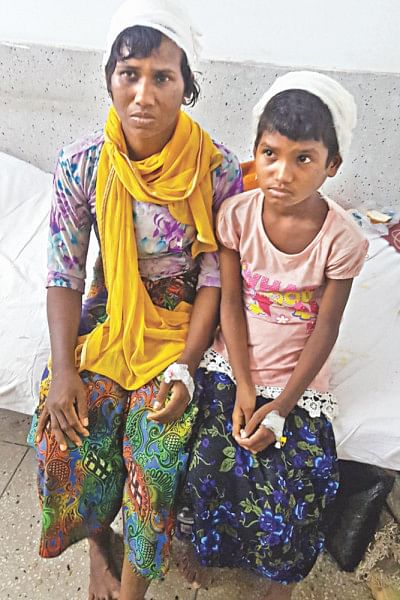For those who wonder what prompted the Rohingya exodus…

Myanmar's de facto leader Aung San Suu Kyi's speech last Tuesday had the potential to change the scenario of the ongoing Rohingya crisis and end the misery of the more than 400,000 refugees in Bangladesh. The United Nations, prior to her delivery, had in fact described it as Suu Kyi's last chance to bring a halt to this chaos.
Instead of adding anything noteworthy or game-changing to the ongoing turmoil, she dished out a number of statements, which left the entire world in utter dismay. Of all her assertions, the one that was especially shocking was this: "We want to find out why this exodus is happening. We would want to talk to those [Rohingya] who have fled, as well as those who have stayed."
To make such a statement after astoundingly remaining silent for the first three weeks of this exodus, the period during which the bloodiest scenes of this disaster were witnessed, clearly suggests that the Myanmar government is in no hurry to solve this ongoing problem.
Since Suu Kyi wants to find out "why this exodus is happening," perhaps it would be a good idea to introduce her to some of the victims I met last week in the refugee camps who are living under dire conditions with no clue as to what the future holds.
Meet Dildar Begum, a 41-year-old mother, currently getting treated at the Cox's Bazar Sadar Hospital along with her 12-year-old daughter Noor Kalima. Dildar was breastfeeding her youngest son, when a group of soldiers entered her house in the village of Tolatoli unannounced and hammered him to death. Her older son, four years old, started screaming and he too was killed. After that, they shot her husband.
They then took her and her daughter to a different house where they met six other women from the village. They were first tortured and then lined up. The security forces then attempted to slaughter them one by one.
"The knife they were using was very sharp," she recalls. "After each stab, they would put the knife in water and I would see the blood flow. They stabbed my daughter as well. Look at her," she says while tilting her daughter's head to show me the scars on her face. After this the army men set the house on fire; they had to finish up their business quickly. They presumed that even if they couldn't kill the women with one swing, the fire would take care of the rest and it was during this space of time that Dildar and her daughter managed to plan an escape.
"They had enough time to take the earring from my right ear but weren't able to remove the one from my left ear. So they just cut it," she says displaying the horrific slit in the middle of her left ear lobe.
Despite all of this, she was still conscious. She knew the house was burning down and as soon as the military left, she carried her daughter and ran for the hills. She walked through the jungle on the hilly terrain for a week before she reached the border and took a boat across the Naf river to reach Bangladesh. Once she arrived at the camp, she and her daughter were taken to the hospital.
In the next room lies 12-year-old Gora Mia, shot on his wrist while trying to run away from the army. The bullet had left a deep wound on the youngster's left wrist and he was yet to receive a bandage for it. "It hurts when I move it a lot, but otherwise it's not too bad," says Mia.
"I am one of the lucky ones. At least I am here. Two of my friends died after bombs were thrown at them. They put petrol in bottles and threw them at us in our village. When they shot me, I fell down and started rolling on the ground," recalls Mia.
"My father saw me and took me away from there into the jungle. It hurt a lot back then. I remember seeing a lot of blood. Those who couldn't run to the jungle were either shot, burnt or slaughtered," says the teenager.
While both Dildar Begum and Gora Mia were lucky that they didn't have to undergo any surgery or lose limbs because of the injuries they sustained, 60-year-old Khurshida, a resident of the Kutupalong camp, didn't share a similar fate. The sexagenarian was shot while she was trying to leave her village. For the next 10 days or so, her son had to carry her until they reached the bank of the river Naf.
"When the military surrounded us and started shooting, we all began to run. After a while, I noticed that my mother's ankle was twisted and that's when we realised that she was shot," says Dolu, her son.
"After we came here, the doctors told us that there was no option. They had to amputate her leg. I felt really bad. She was in a lot of pain. I remember telling myself back then that it would have been better to die rather than live to see my mother in so much pain," he recalls.
The Myanmar military has claimed that they are hunting down members of the Arakan Rohingya Salvation Army (ARSA), a militant group who they claim attacked the army on August 25. But when you walk around the camp and ask people about ARSA, you realise that they barely know anything about the group or how it functions.
"We don't know anything about the ARSA. We don't know how they function and neither do we know who they are. But we are still being shot at. The army threw bombs at us and shot us," says Abul Hasan.
He further narrates the horror: "When the military first came to our village, they called all the residents to attend an emergency meeting. It was over there that they killed all of them together. I didn't go to that meeting because I knew that something wasn't right. I hid with my family for two hours before running towards the hills."
For 12 days, Abul walked through the hills with his pregnant wife Asmida. "It was more painful for her than me. Her legs would get swollen very often and she had to take long breaks," he recalls. Today the couple lives in a crowded tent—made of plastic and wood—in the Kutupalong camp. It is in this camp that his wife gave birth to a baby boy last week.
Abul smiles when asked if his child would be considered a Bangladeshi since he was born here. "I hope he is, because back in Myanmar he won't be considered anything," he says.
The above stories are just a few of the 400,000 chilling tales that you get to hear across the camps in Ukhia. There isn't any shortage of problems. After coming here, they have had to deal with the rains—building and rebuilding their tents—that have lashed the region. Most of the newly arrived Rohingya are hungry and in the absence of proper aid distribution points, they don't really know where to get food from. Many of them are still recovering from the shock of watching their loved ones die in front of them, while others are desperately looking for a way to contact their brothers and sisters who are in hiding back home.
The Rohingya are more than ready to talk about the unimaginable violence they have been subjected to. In fact, they have been talking for days. Unfortunately, the people who are supposed to listen to them aren't listening and, as Amnesty's James Gomez recently put it, have buried their heads in the sand over the horrors unfolding in the Rakhine State.
Naimul Karim is a reporter at The Daily Star.









Comments